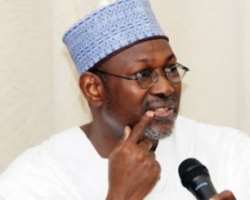We can’t achieve perfect elections in 2015, says Jega

The Chairman of the Independent National Electoral Commission (INEC), Prof. Attahiru Jega, said on Monday that the commission was Workong to deliver a credible election in 2015.
Eventhough, he would not promise perfect election, he assured Nigerians that 2015 elections would be better than the 2011 elections.
Jeff, who spoke while receiving the new United States Ambassador to Nigeria, Mr. James Entwistle, to the commission's headquarters, said INEC would this week embark on a retreat to finalise the 2015 election timetable and consider the budgeting for the Continuous Voter's Registration to be conducted this year.
Jega said the retreat would also focus on other specific aspects that relate to the preparation for the general elections.
According to him, INC is presently taking some steps that will ensure a credible 2015 election, which include staff training as well as consultations with development partners.
Speaking earlier, Entwistle had said they were at the commission to seek ways of assisting the electoral body towards the 2015 general election preparations.
The ambassador revealed his intention to learn about the nation's election processes, especially during the forthcoming elections as well as its democracy.
He expressed the hope that the 2015 elections would be better than previous election experiences' in Republic of Congo, where he was ambassador before.
The envoy, who also commented on the anti-gay bill, which was recently signed into law by President Goodluck Jonathan, said: 'The issue of same sex marriage is very controversial all over the world, including my country where 17 states out of 50 have considered it.'
'Some are saying it is not legal.
The issue that we see and I am speaking as a friend of Nigeria (as I read the Bill because I am not a lawyer), it looks to me that it puts significant restrictions in the Freedom of Assembly and Freedom of Expression and in my opinion especially in advanced democracies, once government begins to say something in these areas, freedom no longer apply. It seems to me that such is a very worrisome precedent.
'The other issue that we and other donors are looking at is the issue of funding for HIV/AIDS. As you know, we put millions of Dollars in the fight against HIV/AIDS. And again, I am not a Lawyer; I read the Bill and it seems to me that it may put some restrictions on what we can do to help fight HIV/AIDS in this country. These are the issues we are looking at as we look at the Bill.'
